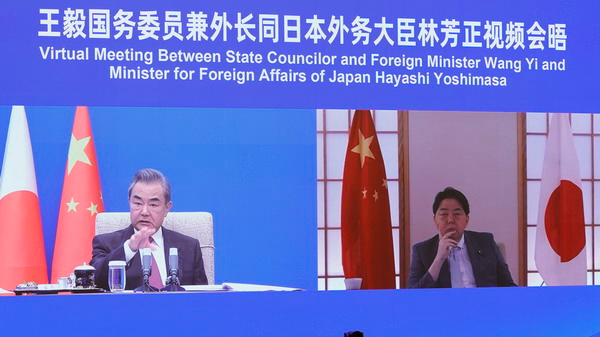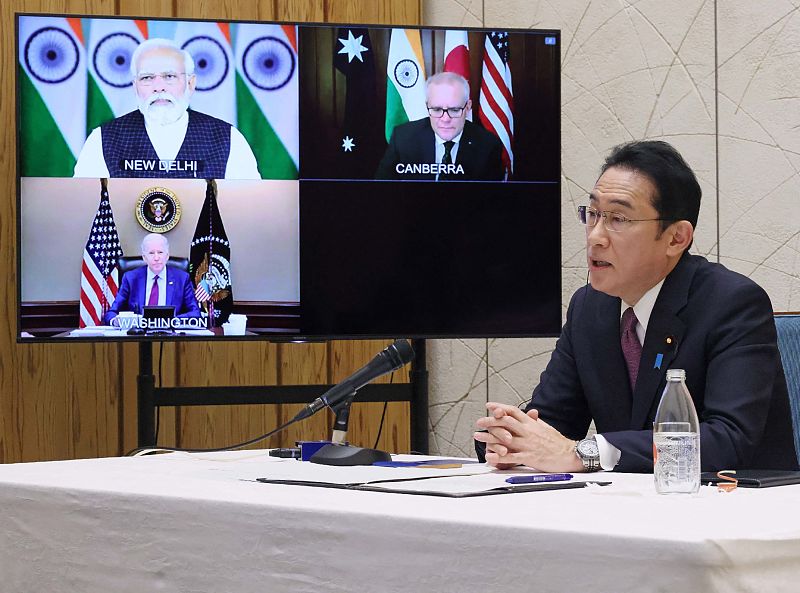
A virtual meeting between Chinese State Councilor and Foreign Minister Wang Yi (L) and his Japanese counterpart Yoshimasa Hayashi, May 18, 2022. /China's Foreign Ministry
A virtual meeting between Chinese State Councilor and Foreign Minister Wang Yi (L) and his Japanese counterpart Yoshimasa Hayashi, May 18, 2022. /China's Foreign Ministry
Editor's note: Hannan Hussain is a foreign affairs commentator and author. He is a Fulbright recipient at the University of Maryland, the U.S., and a former assistant researcher at the Islamabad Policy Research Institute. The article reflects the author's opinions and not necessarily the views of CGTN.
On May 18, Chinese State Councilor and Foreign Minister Wang Yi held a virtual meeting with Japanese Foreign Minister Yoshimasa Hayashi, and cautioned against any U.S.-Japan cooperation approach that harms China's sovereignty, security and development interests and works to incentivize bloc confrontation in the region.
Wang's appeal comes at a time when U.S. President Joe Biden's trip to Asia is increasingly seen in Tokyo and Washington as an opportunity to facilitate joint confrontation with China, demanding legitimate recalibration.
"What arouses attention and vigilance is the fact that, even before the American leader has set out for the meeting, the so-called joint Japan-U.S. anti-China rhetoric is already kicking up dust," Wang said. Such a course risks presenting regional peace as a front for bloc politics and is simply unsustainable at its core.
The disproportionate focus on China to further U.S.-Japan "cooperation" is difficult to overlook. Tokyo and Washington are reportedly working out the contours for a joint statement (not due till next week) that will explicitly mention a so-called policy of cooperation to "deter and respond to" what both governments tout as "Chinese activities in the Indo-Pacific region."
Japanese government sources also reveal a willingness on Tokyo's part to seek alignment with the U.S. on China's strictly internal Taiwan question. All this reinforces the need for Japan to steer absolutely clear of U.S. offerings on containing or interfering in China, given how such blatant interference has produced a false sense of bilateral engagement between Japan and the U.S.
Interests that identify as strictly bilateral should not require any unwarranted focus on China's legitimate economic rise, its sovereign affairs or the broader maritime landscape that Asian powers have adhered to and respected in the spirit of peaceful coexistence. If U.S.-Japan ties continue to build on all these fronts, despite repeated warnings and nuanced regional sentiment, the relationship could become an outlier in promoting peace.

Japanese Prime Minister Fumio Kishida attends the Quadrilateral Security Dialogue (Quad) online meeting at prime minister's office in Tokyo, with Indian Prime Minister Narendra Modi, U.S. President Joe Biden and Australian Prime Minister Scott Morrison, March 3, 2022. /CFP
Japanese Prime Minister Fumio Kishida attends the Quadrilateral Security Dialogue (Quad) online meeting at prime minister's office in Tokyo, with Indian Prime Minister Narendra Modi, U.S. President Joe Biden and Australian Prime Minister Scott Morrison, March 3, 2022. /CFP
Wang's particular emphasis on Japan to "act with caution" and refrain from pursuing a "beggar-thy-neighbor path" will be tested during next week's Tokyo summit of the Quadrilateral Security Dialogue (Quad) – an informal security grouping of the U.S., Japan, Australia and India – which has been at the center of premature and wrongful risk perceptions in the region, as well as toward China.
Instead, Tokyo should value its bilateral ties with Beijing. It should put in the effort to ensure that China's redlines stand respected and that the U.S.-backed China containment hysteria does not overrule Japan's own foreign policy autonomy. Hayashi recognized the "big challenges" facing the international community and placed emphasis on "constructive and stable relations" to make headway. That is in line with the Chinese government's spirit of further developing relations with Japan, where the cornerstones of common understanding are the four China-Japan political documents.
Given the U.S.'s futile containment push, a key expectation now is for Tokyo to be aware that some forces are keen to challenge the vitality of the China-Japan relationship and would welcome any deviation from chiefly bilateral interests. In Wang's telling, a key step forward is for Japan to cede no ground to "forces trying to undermine bilateral relations" to become more powerful.
If wisdom was to prevail, Tokyo's inputs to future U.S.-Japan cooperation would steer clear of China's sovereignty, security and development interests. Meanwhile, the perils of U.S.-led containment designs towards China are becoming increasingly evident in Asia: bloc politics has minimum traction with some of Japan's leading political and economic allies in the region and the possibility of an Asia-Pacific variant of NATO is, at best, a mirage.
I consider it a mirage and wishful thinking because none of the proposed security arrangements are about upholding principles of regional peace and stability in Asia. In fact, much of the U.S. case for "containment" in Asia is driven by interference in regional countries' sovereign affairs. Japan would be ill-advised to stick its neck out for the U.S. and complicate regional stability by willingly endorsing negative moves against China.
From time to time in the past, Tokyo has appeared sensitive about its exercise of autonomous foreign policy choices in Asia. Allowing that autonomy to be consistently overruled by the U.S. is enough to understand that the current trajectory of "cooperation" risks major interests and aspirations if not managed properly.
(If you want to contribute and have specific expertise, please contact us at opinions@cgtn.com. Follow @thouse_opinions on Twitter to discover the latest commentaries in the CGTN Opinion Section.)

